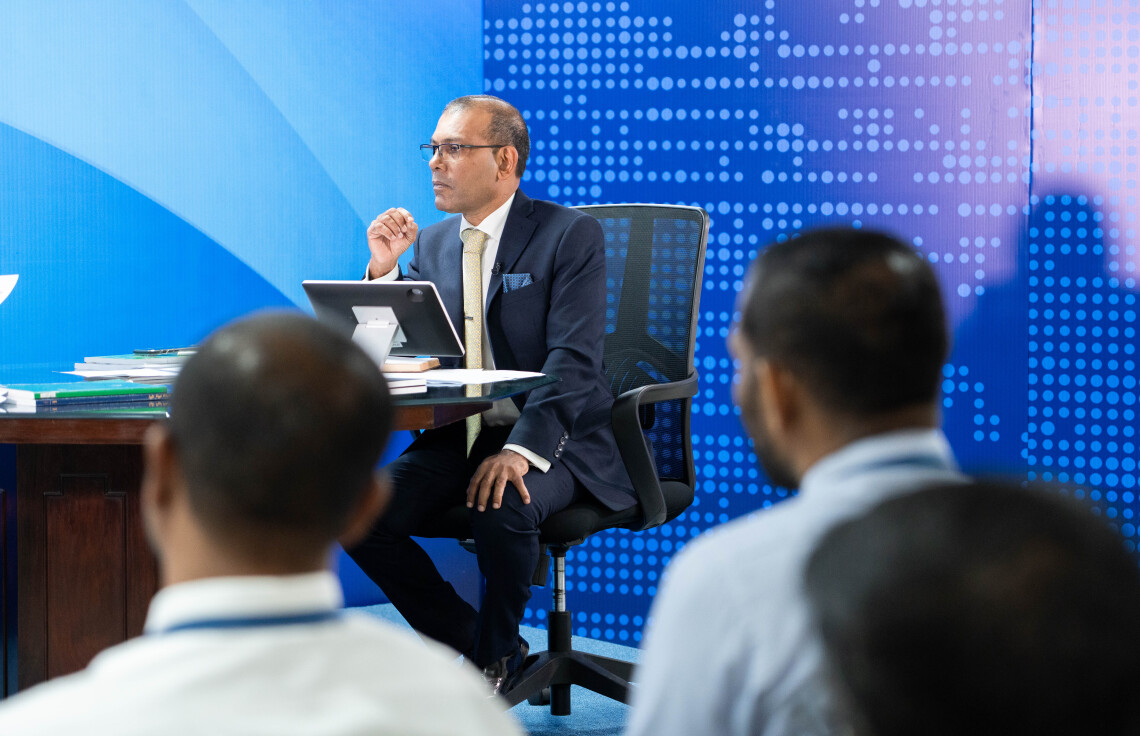Malé, Maldives – Former President and Speaker of Parliament, Mohamed Nasheed has told that there should be no talk of an MDP presidential primary without a referendum vote to change the system of government.
Replying to a question from a member of the public on the Ask Speaker programme, Speaker Nasheed said one of the most important promises in the MDP’s manifesto for the 2018 presidential election is to find out the people’s views on changing the system of governance.
Speaker Nasheed said there could be no talk of a presidential primary without a referendum vote. He said it was not right to head for a presidential primary that did not fulfill the promises in the manifesto.
MDP presidential primary is rumored to be held early months of next year. MDP has said it will open the primary after the administrative arrangements are completed.
Both President Ibrahim Mohamed Solih and Speaker Mohamed Nasheed have announced their intention to contest the primary.
Nasheed announced his decision to contest the MDP presidential primary at a meeting with his closest associates earlier this week. Nasheed’s campaign is also scheduled to begin next Friday in GDh. Thinadhoo.
While there has been a lot of talk lately that Nasheed is going to contest the primary, but the Speaker of the Parliament has not officially said anything about it. However, Nasheed has repeatedly said that he does not want to work with the incumbent President Ibrahim Mohammed Solih and cannot support him in the primary.
MDP is now divided into two factions due to tensions between the President Solih and Speaker Nasheed.
MDP MPs, government ministers and members of the public who support President Solih, say the president should be given a second term. President Solih announced his candidacy for a second term in May this year.
This is Speaker Nasheed’s most recent public comments on the governing system after the Maldivian Democratic Party’s congress in last August in which Nasheed withdrew the decree for a constitutional referendum to change the political system of the Maldives from Presidential to Parliamentary at the last minute.
The decree submitted by Speaker Nasheed to the Maldivian Democratic Party’s (MDP) congress held from August 19 – 21, 2022, read that it has become difficult for a single party to win a presidential election and run the government with absolute rule due to the presidential election and election processes under the current constitution.
Nasheed, who received little support from his own party on his endeavor to make Maldives a Parliamentary system, withdrew the decree before it was opened for debate to the congress floor citing that an agreement was reached between him and President Ibrahim Mohamed Solih to discuss the matter further.
He further stated that discussions between him and President Solih has been going on before the congress started and during the congress as well and that both of them decided that the congress was not the platform to debate on the governing system.
The withdrawal of the decree came while President Ibrahim Mohamed Solih expressed his views opposing the establishment of a Parliamentary system in the Maldives, and has called for the withdrawal of the resolution in an interview he gave to a local media on August 16, 2022.
Nasheed’s proposed amendment to the constitution stated that the head of government would be the Prime Minister elected by the Parliament Members, and that the head of the state would be the President elected via presidential election.
Nasheed also called to determine in the constitution, the powers of the head of state and the powers and responsibilities of the President when the Prime Minister runs the country, as well as the representation of Parliamentary constituencies and the formulation of a “National List” of members based on the votes secured by parties in the Parliamentary elections.
Further, he also proposed to limit the number of Parliament member at a maximum of 87 and to determine that the government will be run by a Cabinet of Minister appointed among the Parliament Members. He also proposes to determine that the number of Supreme Court Justices be limited to 5.
Other proposed amendments included the determination of changes to be made to the structure of the Judicial Service Commission (JSC), and to include the basic characteristics of the Decentralisation Act of Maldives in the constitution.
Speaker Nasheed has on multiple occasions pushed to convert the current presidential system to a parliamentary system. Nasheed had signed a petition of over 109,000 signatures previously, urging President Solih to convert the governance system to parliamentary.





